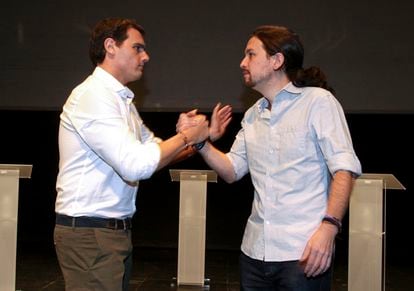Juan Manuel Moreno Bonilla and Alberto Núñez Feijóo (in the corridor) greet members of the Board of Directors of the PP.Luis Sevillano
Two out of three Andalusians who went to vote last Sunday deposited one of the ballot papers of the old bipartisan system.
Something similar has not happened in Andalusia since 2012, and in Spain it has not happened again since a year before.
Then it was the time when the sum of PSOE and PP was often close to 80% in the national group and in the communities without nationalist formations.
After the collapse of the Spanish political duopoly during the Great Recession, in each general election of the last decade socialists and popular have gathered at most half of the votes.
All analyzes suggest that the trend has changed.
Bipartisanship emerges again, in a less overwhelming version than the one that has monopolized Spanish politics since 1993 —when the centrist CDS alternative collapsed— and 2015,
Belén Barreiro, director of the sociological research institute 40dB., had been perceiving for almost a year an increase in the sympathy of those surveyed for the two main parties.
The Andalusian result has confirmed it.
The agony of Ciudadanos has reconfigured the forces in the center-right, with an important regrouping in the PP.
On the left, the concern of the PSOE with United We Can is not that it eats up ground as was the case before, but that the decline of that space leaves it without a partner that the Socialists have assumed as essential.
On the right flank, Vox subsists with an important bite, although the Andalusian elections and the analyzes of the demographic institutes suggest that it is stagnating.
"The pandemic has operated in the opposite way than the economic crisis: it has strengthened the government parties," says Narciso Michavila, president of the GAD3 consulting firm, who reinforces his diagnosis with the results of all the elections held in Spain since the spring of 2020 : in Galicia, the Basque Country, Catalonia, Madrid, Castilla y León and Andalusia, the Executives repeated their mandate.
It is true that none were socialists and that the exception to this trend would be embodied by the government of Pedro Sánchez, limping in the polls, "because its two brands have suffered a lot of wear and tear," argues Michavila.
Albert Rivera and Pablo Iglesias greet each other before a debate in November 2015. Jaime Villanueva
The reconfiguration of forces seems clear, although still very far from thinking about a restoration of the old electoral distribution.
To Spanish bipartisanship, political scientists used to add the nuance of imperfection, both due to the presence of nationalists and a space to the left of the PSOE, a minority and with ups and downs, but resistant over the years.
Something similar is happening now on the right, where the recovery of the PP does not cover all that territory, from the center to the extreme, which it monopolized for two decades.
The new two-party system that is emerging would be even more imperfect, with two parties that have regained hegemony in their ideological spaces, without reaching the strength that once allowed them to alternate in power alone.
Just three months ago, in the midst of the implosion of Pablo Casado's mandate in the PP, polls were published that fed the dream of
sorpasso in Vox
.
Today such a hypothesis sounds implausible to specialists.
The enormous expectations of the extreme right have been drowned in a bath of reality, which does not prevent it from having been able to consolidate an important electoral base during this time.
Some analysts take it for granted.
Barreiro is cautious: “The behavior of the voter on the left and on the right are not the same.
On the left, the territories are more clearly defined, not only between two electoral options, but also between two different ways of seeing the world.
Among right-wing voters, everything is more fluid.
The proof is how Citizens have been abandoned en masse in such a short time.
What we have to check is whether Vox has developed a clear voter identity.”
To govern without having to pay any toll to the extreme right, as has happened in Andalusia, the PP would have to complete a feat that, with today's data, seems remote.
The historical review of 45 years of general elections indicates that to achieve an absolute majority, at least 40% of the votes are needed.
The PSOE of Felipe González, for example, was left with just 175 seats in 1989 with 39.6% of the vote.
José Luis Rodríguez Zapatero, on the other hand, far exceeded 40% in his two triumphs —2004 and 2008— and even so he did not reach an absolute majority.
In the two that the PP has conquered — that of José María Aznar in 2000 and that of Mariano Rajoy in 2011, both very comfortable — the winning party went beyond 44%.
If we take as a reference the data of the last general elections of November 2019, the PP, which did not reach 21%, would need to monopolize practically all the space on the right to approach at least a result like that of Andalusia: add up to the last of the Ciudadanos voters —almost 7%— and reduce the 15% of Vox to a minimum.
Alberto Núñez Feijóo's team aspires to grow in another direction, that of the most centrist flank of the PSOE electorate.
The current leader of the PP had achieved it in Galicia, and Juan Manuel Moreno has now repeated it in Andalusia, where the pre-election polls, such as the 40dB one, have already been carried out.
for EL PAÍS, they indicated that more than 10% of former socialist voters would cast the PP ballot this time.
There Michavila and Barreiro agree that there may be a gap for Feijóo,
that of the moderate voters of the PSOE who reject the agreements with the nationalist groups.
“The center voter coincides quite a lot with the left in certain values, but in the territorial issue he identifies with the right”, explains the director of 40dB.
Another factor that would facilitate Feijóo's work would be a great demobilization of the left, as has happened in Andalusia and already favored in 2000 and 2011 the absolute majorities of the PP.
Last Sunday night, after knowing the results of the polls, Toni Roldán wrote on Twitter: "This election points to an end of the cycle that began in 2015."
This economist lived in the front line that change of era as a member of the Ciudadanos leadership, which he abandoned before the second elections of 2019 in direct discrepancy with the politics of Albert Rivera.
In the previous four years, the birth of "a different party system" had been glimpsed, in which Roldán saw the possibility of consolidating a "liberal, reformist and regenerationist" force.
Ciudadanos now seems doomed to the same fate that the attempts to raise a centrist alternative in Spain have suffered in the last four decades, from the UCD to the CDS of Adolfo Suárez and the UPyD of Rosa Díez,
all disappeared after a fleeting moment of glory.
As for the left, Roldán points out, United We Can stabilizes "in a space similar to that occupied by IU in its best moments, between 10% and 15%".
"The Andalusian elections", underlines the former deputy and former leader of Ciudadanos, "have served to confirm that a change of hegemony is no longer possible in either of the two poles, as it might seem these years."
"Populism can work in the exaltation of certain moments, but in the end it is the fire of a day," he says.
The new situation forces the two major parties to reorient their strategy, because now "they must compete more for moderation and not so much with the extremes of their poles."
Roldán believes that Feijóo is already in that line and that Sánchez will have to consider it.
"Bipartisanship has taken on a certain air in Spain," concedes someone who still insists on fighting it, Juan Carlos Monedero, political scientist and founder of Podemos.
More than the merit of the big parties, he assures him, it is "the result of the mistakes" of those who could challenge him at this time, Vox and United We Can.
This return to traditional politics does not correspond to the trend in most democracies.
The old political system, says Monedero, "has exploded throughout Europe", where among other things "the extreme right is eating up the right".
France is a clear example, as well as of the “new political forms emerging from the left that are replacing social democracy”, in the words of the political scientist.
for wallet,
The reason that Spain has taken a different course lies in the "linkage with the past" that the most recent formations maintain.
Vox, according to him, "is not a populist right, it is Francoist, reactionary and with nineteenth-century overtones."
And on the other side is "a left heir to the PCE that has not finished renovating itself" and becoming "more typical of the 21st century."
That space that struggles with the "conservatism of the PSOE" is still open, defends the founder of Podemos, waiting to see if the initiative still in the making by Vice President Yolanda Díaz manages to "reconfigure the forces and express a novelty."
And on the other side is "a left heir to the PCE that has not finished renovating itself" and becoming "more typical of the 21st century."
That space that struggles with the "conservatism of the PSOE" is still open, defends the founder of Podemos, waiting to see if the initiative still in the making by Vice President Yolanda Díaz manages to "reconfigure the forces and express a novelty."
And on the other side is "a left heir to the PCE that has not finished renovating itself" and becoming "more typical of the 21st century."
That space that struggles with the "conservatism of the PSOE" is still open, defends the founder of Podemos, waiting to see if the initiative still in the making by Vice President Yolanda Díaz manages to "reconfigure the forces and express a novelty."
Toni Roldán also believes that there should be room for a "liberal and Europeanist" formation and that all projects in that direction have failed in the last 40 years "is not a historical curse."
That possibility glimpsed in 2015 has been closed for the moment, concludes who became part of the ruling circle of Ciudadanos.
His balance of these years throws a devastating self-criticism: “Our contribution has been practically nil.
We were able to provoke some debates on issues such as the electoral law, but in the end no important reform has been achieved: legislative, in education, in taxation... And we also contributed to polarization and to implanting a superficial policy, in which the zasca that the idea, with leaders who more than political leaders seemed televreachers.
50% off
Exclusive content for subscribers
read without limits
subscribe
I'm already a subscriber












/cloudfront-eu-central-1.images.arcpublishing.com/prisa/KMEYMJKESBAZBE4MRBAM4TGHIQ.jpg)


